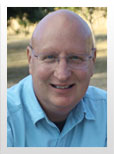|
To receive daily emails from Breaking Christian News to your inbox CLICK HERE
BCN Exclusive: Radio Host, Author, Teacher Steve Gregg, Discusses What Happened with Tuesday's Big Debate between Ken Ham and Bill Nye
Steve Gregg is host of the Christian call-in radio program, "The Narrow Path," airing on several stations in the west and northwestern US. His program teaches through the Bible, as he answers call-in questions along the way. The subject of Creation vs. evolution is often discussed on "The Narrow Path," and Mr. Gregg has also debated on the subject in the past. (Photo via The Narrow Path) In light of the recent debate between Creationist Ken Ham from Answers in Genesis, and Bill Nye, an evolutionist; I asked Steve for his thoughts and comments, as well as perhaps some answers to some of the questions that seemed to go unanswered on Tuesday night. Steve, can you give us a little background on yourself first, and then also in regard to debating the theory of evolution? Among other things, I am a radio journalist, whose main focus is on matters of concern to thinking Christians. I am not formally trained, either as a scientist or as a theologian. I am merely an inquisitive lover of truth, wherever it may be found. This means I appreciate any truth that can be obtained through scientific inquiry, as well as truth that may come through other avenues—e.g., history, philosophy, logic, experience, divine revelation—you name it. The latter, when it is genuine, informs or trumps the others. As a thoughtful truth-seeker, I am compelled by fair-minded inquiry to be a convinced Christian, believing in the competence and authority of the writers of the Hebrew and Christian Scriptures. The strength of my conviction about this matter is the result of critical investigation, confirmed by personal experience. This conviction, however, does not translate into any commitment to interpret the Bible in any particular manner (i.e., literally or non-literally), other than that which the authors seem to intend. This means I am at liberty to interpret poetry as poetry, parable as parable, metaphor as metaphor, and historical narrative as historical narrative. All of these may be found in the Bible. I have made a lifelong study of the evolution controversy. Since I have lived only one lifetime, I do not know all that can be known on the subject. My tentative conclusion is that Genesis 1 is intended as historical narrative, so that my default approach is to take it literally. I know, however, that some Biblical narratives are not intended to be taken literally, as in the case of parables, but I have not yet seen compelling evidence that such is the case with Genesis 1. I have done my best to hear the most prominent voices in the evolution controversy, and I think that I understand most of the major arguments of the evolutionists—probably better than they understand the mindset of the Creationists. In addition to reading, I have had occasion to debate, both formally and informally, a number of evolutionists. There are certainly data that trained scientists can raise, the implications of which I would be at a loss to expound upon. Nonetheless, my personal goal has been to be adept more in the analysis of arguments than in the mastery of every scientific discovery. The sciences have become so specialized that even a trained scientist in one field is essentially a layman in other scientific fields. I am no scientist, but I am what most people are (or ought to be)—a critical thinker who desires to know what is true, and who will analyze an argument's validity prior to accepting any conclusions. As you watched the debate Tuesday night, what were your thoughts on it?
One of the things Bill Nye persisted in asking Ken Ham for was a scientific "prediction" ... a. Can you clarify what Bill meant by that? b. It didn't seem like Ken really had an answer for that, can YOU give an example of the "prediction" for which Bill kept asking? The strength of genuine science is its ability to make genuine predictions, based upon reliable patterns or "laws" of nature. If I want to know how hot water must be in order to boil and sterilize my instruments, science can predict this exactly. If I want to know how much thrust and lift will be necessary to lift an aircraft of a certain tonnage off the ground, science can predict this. Bill Nye was suggesting that only evolutionary science is able make such predictions. Of course, his challenge was pretty weak, since a scientist believing in supernatural Creation is able to make this kind of predictions as accurately as can a scientist believing in naturalistic evolution. Creation science, like evolutionary science, does not impact observational or experimental science. Creationists admit this, because they recognize that Creation is an explanation of origins—which occurred in the unobservable past, and cannot, therefore, be the subject of direct observation. Darwinian evolution, similarly, is a theory of past events, since no one has ever observed one kind of creature evolving into another. These are divergent theories on origins—that is, on history—rather than of observational science. However, Creation and evolution provide philosophical models from which predictions may be made—not predictions about what will happen in a laboratory experiment, but predictions about what one would observe in the real world of nature and paleontology. Bill Nye said that evolutionists shined in this area, because their theory predicted that they would someday find an intermediate between fish and amphibian, and—lo and behold!—they found Tiktaalik, a fossil creature bearing some fishlike characteristics and some amphibian characteristics. Nye said that Creationists cannot make such predictions. This is disingenuous, since Creationists make predictions all the time about what they expect to find in nature. For example, Creationists predict that paleontology will never unearth the vast array of finely-graded transitional forms between any two animal or plant groups. So far, this prediction has proved accurate. Creationists predict that no one will ever observe matter, without intelligent direction, forming itself into an information-rich code (like DNA or its precursors). So far, this prediction has proven to correspond with reality. I think that Creationists make about the same number of predictions about what may be found in nature and paleontology as do evolutionists. No doubt it's easy to "armchair quarterback" a debate like that, where you have such a limited time to give arguments and rebuttal, but what things would you have focused on differently, and do you agree with Ken Ham's interpretation of the age of the earth? While I agree with Ken Ham's view of the age of the earth, I do not agree with the importance he places on that particular aspect of the debate. I believe that Creation, Christianity and the Bible could be equally true, whether the earth is thousands or billions of years old. Ken does not seem to agree with me on this. I think Ken gave the impression that, if the earth is billions of years old, then Christianity cannot be true. This places the credibility of Christianity on the wrong basis—one that is considerably more fragile than the real foundation upon which it rests. We believe in Christianity because of Christ, not because of a particular interpretation of Genesis 1. That Christ lived, died and rose again, having done and claimed astonishing things before many witnesses, are facts that rest on the most solid of historical grounds. Unlike belief in young-earth Creationism, faith in Christ does not depend upon any particular theory about the inspiration of Scripture, but on eye-witness testimony of exceptional quality and credibility. As for what I would wish to have seen different in the debate, I would have liked for Ken to press harder against evolution on those evidences more pertinent to the origins of things, rather than on the young-earth flood geology debate. To my mind, the debate is not so much about Genesis 1 as it is about God's role in bringing everything into existence. Do you think it was a good thing for Ken to debate Bill or not, do you think it caused some Christians to doubt the Bible account of Creation? It may have. Debates should provide an opportunity to assess the strengths and weaknesses of different viewpoints, and we can be sure that the truth will always have the best argument. However, the best arguments for a view may not emerge in a given debate, owing to the weakness of a presenter or, simply, the shortage of time to make the whole case. I think Ken Ham is pretty knowledgeable of the issues and had every good reason to participate in the debate. Whether the best arguments for his view were featured or not is another matter. I did not think Ken did as well as someone like Phillip E. Johnson or Duane Gish would have done, but, on balance, I thought he did better than did Bill Nye. Too often the latter simply resorted to, "The Creationists' assertions just don't make sense to me." This may be enough reason for Bill Nye to reject Creationism, but it should not dictate our conclusions. True things may not make sense, even to a reasonable man, if he does not understand the basis of his opponent's worldview, and cannot assess the sensibleness of the assertions in terms of that worldview. Ken Ham obviously understood science better than Bill Nye understood the Bible. I lost track of the number of times Bill Nye said that the difference between himself and Ken Ham was that Nye believed in the fossil which he picked up by the side of the road while driving to the debate (which he referred to as "what we can observe"), while Ken Ham believed in a book "translated for 3,000 years into American English." First, Bill Nye does not believe what he observes any more than does Ken Ham. Both of them can see the fossil sitting upon Bill Nye's podium. Neither of them denies its existence, nor its significance. Where they differ is upon certain metaphysical presuppositions about the nature of reality and upon matters of origin. Neither of these things can be known by direct observation without the importation of an interpretive grid. Bill Nye's naturalistic grid is no more demonstrable scientifically than is Ken Ham's supernaturalism. Second, it is clear that Nye had no grasp of the fact that no Biblical scholar depends upon Bibles "translated into American English," and that it makes no difference how many times, or into how many languages, the Hebrew Bible may have been translated, since a scholar can bypass all the myriad translations and simply look at the Hebrew. That Bill Nye fell back so frequently and so heavily on this repeated mantra only made him look ignorant. He would have done better to stick with matters within his field and left the appraisal of the Bible translations to those who know something about that subject. Any chance you might someday go up against Stephen Hawking, to debate the existence of God?
Is it important for everyday Believers in Jesus to be able to answer basic Creation vs. evolution kinds of questions, and why or why not? If Christians do not ask these questions, they are not likely to find answers to them. If Christians do not find answers for themselves to such questions, they will be stuck with only such answers as unbelievers present, whether they are good ones or not. We are not likely to fully appreciate the strength of the basis for our beliefs unless we subject them to critical scrutiny. If our beliefs are true, nothing can disprove them, and our confidence in them will be strengthened by having made the investigation. What would you say are some of the best ways for Christians to become more informed about what they believe regarding Creation, and to learn how to better present the Creation view as they come up against the theory of evolution? A person needs to determine how much time he/she can devote to developing a thorough knowledge of the topics that enter into this debate. Obviously, one could make a career of researching the published works on both sides of this controversy, without exhausting the available information. Most people will not have the time to study more than a fraction of the relevant material. I do believe that Phillip E. Johnson's 1991 classic, "Darwin on Trial," is a good overview for the non-specialist, who wishes merely to get a sense of the main issues under debate. I personally think that book should be required reading for evolutionists and Creationists alike. Our thanks to Steve Gregg for his time on this interview. To find out more about his radio program, "The Narrow Path," Click Here.
To receive daily emails from Breaking Christian News to your inbox CLICK HERE
Other Recent Articles from Breaking Christian News Hundreds Accept Jesus Christ in Poland at Franklin Graham Rally Grammy-Winning Christian Artist Mandisa Has Died: Report How You Can Send Letters of Encouragement to Jailed Pro-Life Heroes Illegal Immigrants Being Moved into Soldiers' Home Where Veterans Must Pay to Stay House Democrats Vow to Codify 'Rights' to Trans Surgeries, Hormones, Puberty Blockers Israel Strikes Deep Inside Iran, Nuclear Facilities NOT Hit An Important Message from Japan to the world about the WHO, Japan and the Next So-called 'Vaccine' Farmers, Truckers Warn California Emissions Mandates Will Cause 'Catastrophic' Supply Chain Crisis Fed Court Overturns State Law Protecting Women's Sports from 'Transgender' Athletes Biden's Education Secretary Vows to Shut Down the Largest Christian University in the US US to Back Rafah Op in Exchange for Israel Dropping Major Iran Strike; Report Schumer Succeeds in Killing Off Mayorkas Impeachment Trial before It Can Even Begin California Town Tears Down Beloved Hillside Cross Danielle Smith Again Defends Alberta's Coming Ban on Transgender Mutilation of Children |
All articles on this site and emails from BCN are copyrighted property of Breaking Christian News. Permission is given to link to, or share a BCN story if proper attribution is given to both the original writer and summarizer of the story. Breaking Christian News 2005-2019. All Rights Reserved.
Breaking Christian News is a division of Elijah List Publications, Inc. All Rights Reserved
Disclaimer: Articles and links, as well as the source articles linked to; do not necessarily reflect the opinion of Breaking Christian News.
| Home | Store | Subscribe | Facebook | Article Archive |



 "Bill Nye said that Creationists cannot make such predictions. This is disingenuous, since Creationists make predictions all the time about what they expect to find in nature. For example, Creationists predict that paleontology will never unearth the vast array of finely-graded transitional forms between any two animal or plant groups. So far, this prediction has proved accurate. Creationists predict that no one will ever observe matter, without intelligent direction, forming itself into an information-rich code (like DNA or its precursors). So far, this prediction has proven to correspond with reality. I think that Creationists make about the same number of predictions about what may be found in nature and paleontology as do evolutionists." -Steve Gregg, "The Narrow Path"
"Bill Nye said that Creationists cannot make such predictions. This is disingenuous, since Creationists make predictions all the time about what they expect to find in nature. For example, Creationists predict that paleontology will never unearth the vast array of finely-graded transitional forms between any two animal or plant groups. So far, this prediction has proved accurate. Creationists predict that no one will ever observe matter, without intelligent direction, forming itself into an information-rich code (like DNA or its precursors). So far, this prediction has proven to correspond with reality. I think that Creationists make about the same number of predictions about what may be found in nature and paleontology as do evolutionists." -Steve Gregg, "The Narrow Path" I was disappointed that the debate seemed to focus almost entirely on questions of the age of the earth and of the global flood. While I incline toward the "young earth" view myself, and accept a global flood, I think that these subjects stand more in the category of faith commitments of Biblical literalists, whereas the Creationist's rhetorical strengths have more to do with the arguments related to the origins of life, consciousness, rationality, and such. Ken Ham mentioned these things, but Bill Nye was stuck on the age-of-the-earth issues. Ken Ham took the bait and spent much of his time defending the young earth, rather than the specific facts of divine Creation. I am aware, however, from experience in debates, that one is given very limited time to make one's best points. When your position has hundreds of good points in its favor, it is not easy to decide, on the fly, which are the best ones with which to fill your five-minute time allotment.
I was disappointed that the debate seemed to focus almost entirely on questions of the age of the earth and of the global flood. While I incline toward the "young earth" view myself, and accept a global flood, I think that these subjects stand more in the category of faith commitments of Biblical literalists, whereas the Creationist's rhetorical strengths have more to do with the arguments related to the origins of life, consciousness, rationality, and such. Ken Ham mentioned these things, but Bill Nye was stuck on the age-of-the-earth issues. Ken Ham took the bait and spent much of his time defending the young earth, rather than the specific facts of divine Creation. I am aware, however, from experience in debates, that one is given very limited time to make one's best points. When your position has hundreds of good points in its favor, it is not easy to decide, on the fly, which are the best ones with which to fill your five-minute time allotment. He has not invited me. It is not likely that he will do so, since there are better experts than myself who would be asked before I would be. In any case, I would not object to discussing the God question with Professor Hawking. His recent book on the subject demonstrated that, however ingenious he may be at theoretical physics (something I know nothing about), he is not superior to any other man when it comes to philosophizing about ultimate issues outside his field. Again, it is a problem inherent in specialization. (Photo via Facebook)
He has not invited me. It is not likely that he will do so, since there are better experts than myself who would be asked before I would be. In any case, I would not object to discussing the God question with Professor Hawking. His recent book on the subject demonstrated that, however ingenious he may be at theoretical physics (something I know nothing about), he is not superior to any other man when it comes to philosophizing about ultimate issues outside his field. Again, it is a problem inherent in specialization. (Photo via Facebook) 








